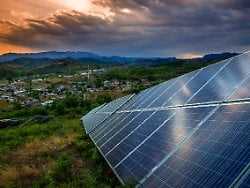Sunday, January 02, 2022
Beijing claims land
Chinese farmers complain about solar power
The fact that China is getting more electricity from renewable energies is central to the fight against climate change. And Beijing is trying to go this way too. But for some farmers this has dramatic consequences.
They are beaten, driven from their land or even imprisoned: Many farmers in China say they are paying a high price for the government’s ambitious promise to run the Olympic Games entirely with renewable energies. The 2022 Winter Games in Beijing should be the first to exclusively use wind and solar energy. But the facilities for this need space – according to activists, numerous farmers have to clear their fields for this.
The Long family, who work their fields near the capital Beijing, are among the farmers affected. The family reports that they had to give up more than half of their farmland to build a solar farm. Now their income is so low that they have to burn corn husks and plastic bags to avoid freezing in winter.
“We were only promised 1,000 yuan per mu of land a year when the utility leased the land for 25 years,” says Farmer Long. It relates to the Chinese mu, which corresponds to around 667 square meters – for this the farmer receives the equivalent of around 139 euros per year. “We could make more than twice as much if we were growing corn in the same area,” says Long.
China is the world’s largest manufacturer of wind turbines and solar cells. The Winter Olympics should be a good opportunity for manufacturers to gain global attention for their products and technologies.
Kraftwerk would meet the needs of Slovenia
In order to ensure that the Olympic Games run smoothly and to relieve the Chinese capital of the smog of the winter months, a huge power plant was built in the Hebei province bordering Beijing, which provides electricity from renewable energy sources. The plant generates 14 billion kilowatt hours of green electricity a year, which is equivalent to Slovenia’s annual energy consumption.
But for farmers like Long and his neighbor Pi, the transition to green energy is making life more difficult and dangerous. According to Pi, the villagers of Huangjiao were forced to sign contracts leasing their land for a solar park built by the State Power Investment Group (SPIC) – one of the country’s largest energy providers.
Those who did not consent were beaten by the police, he says: “Some were hospitalized, others were arrested.” Pi said he was imprisoned for 40 days and that his neighbor Long was jailed for nine months after participating in a public protest for “illegal gathering and disturbing the peace”.
It was not possible to verify whether the electricity from the SPIC solar park near Huangjiao will also be used to power the Olympic Games. However, the authorities of Zhangjiakou – one of the cities hosting the Games – say the Hebei region has become “the largest non-hydropower renewable energy location in China” since it applied to host the Olympic Games.
Allegation: illegal seizures
According to Amnesty International, this rapid transition to green electricity in China is accompanied by numerous human rights violations. The organization denounces “evictions, illegal land confiscation and the loss of livelihoods” of many Chinese.
By 2030, China wants to generate 25 percent of its electricity from non-fossil fuels. To achieve this goal, however, the country will need to more than double its current wind and solar capacity. Environmentalists fear that numerous other farmers and landowners will have to give up their fields for it.
China Academy of Engineering expert Jiang Yi told a state news website that China will need 30,000 to 40,000 square kilometers more land to meet its renewable energy needs. “Where to get the land from has become the biggest obstacle to the development of the industry,” he said.
